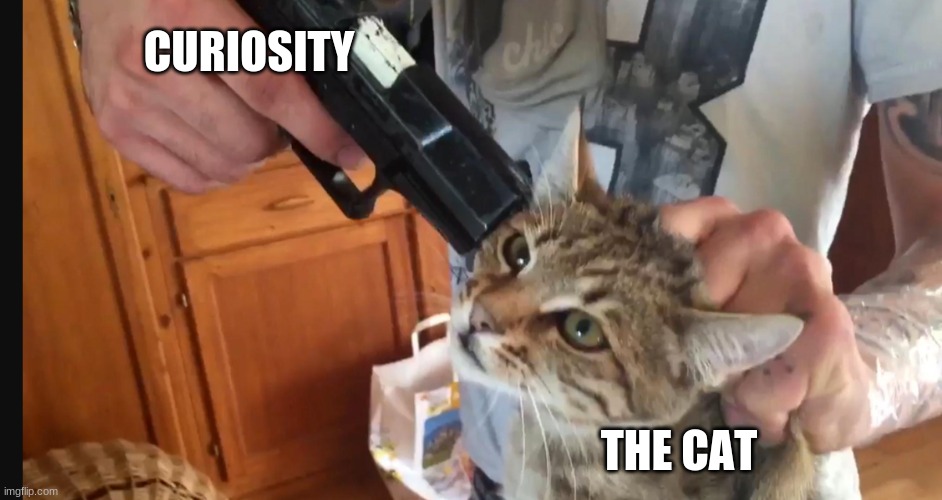
Curiosity Killed the Cat Idioms Online
The phrase 'curiosity' is developed from an older phrase, 'care killed the cat'. By 'care' the person who coined the expression meant 'worry/sorrow' rather than 'take care of/look after'. The expression finds its first recorded mention in the English playwright Ben Jonson's play Every Man in His Humour, 1598:

📽️ 123Movies Watch Curiosity Killed the Cat (2012) HD Full Movie
Asperger's Today Posted Reviewed by Ekua Hagan Find a therapist to combat fear and anxiety We are all familiar with the common proverb, "Curiosity killed the cat," but what was the origin of.

Killing The Cat A Review Of Curiosity At Work Cat Meme Stock Pictures
Whoever coined the proverb "curiosity killed the cat" obviously never met a man like Hilary Knight. At ninety-one years young, he still works prolifically, dreams of riding an elephant in India, and plans to drive cross country when he moves to Pasadena to be closer to his identical twin nieces, Lily and Kitty Knight.

"Curiosity killed the cat" Meaning Poem Analysis
Curiosity Killed The Cat were a London-formed British pop band that achieved success in the UK in the late 1980s and comprised of vocalist Ben Volpeliere-Pierrot (born Martin Benedict Volpeliere.

Curiosity Killed the Cat Tour Dates 2017 Curiosity Killed
Origin of this idiomatic expression. The idiom 'curiosity killed the cat' was in fact, first used as a literal description of a cat who had let his curiosity get the better of him and he ended up dying as a result. The term was used in a newspaper report about the death of this particular cat, all the way back in 1916 in New York.

Eugene O'Neill Quote “Curiosity killed the cat, and satisfaction
The phrase "curiosity killed the cat" seems to have originated as "care killed the cat" from Every Man in His Humor, a popular play by Ben Jonson, published in 1598. In the play, the phrase goes thus; "Helter skelter, hang sorrow, care'll kill a Cat, up-tails all, and a Louse for the Hangman.". However, it is not the standard.

Curiosity Killed the Cat (2016) Photo Gallery IMDb
Meaning: The term curiosity killed the cat is an expression that's used as a warning for anyone who is acting excessively curious, as their prying behavior may lead them to harm. Example: If you go snooping all over the place, you might spoil the surprise. It's said that curiosity killed the cat, so stop poking your head around.

Curiosity Killed The Cat Phrase And Text HighRes Vector Graphic
Curiosity killed the cat Listen to pronunciation: "Curiosity killed the cat" is an English proverb. It describes the dangers of being too curious. E.g. When he couldn't resist any longer, his curiosity killed the cat, leading him to open the mysterious old chest he had discovered in the attic.

curiosity killed the cat Imgflip
The proverbial expression 'curiosity killed the cat', which is usually used when attempting to stop someone asking unwanted questions, is much more recent. The earlier form was still in use in 1898, when it was defined in Brewer's Dictionary of Phrase and Fable: "Care killed the Cat.

"Curiosity Killed the Cat" Meaning, Origin and Easy Examples • 7ESL
The saying "curiosity killed the cat" is a popular expression warning about the dangers of unnecessary investigation or experimentation. It suggests that being overly curious can lead to trouble or harm. In short: It warns about the potential risks of being too curious.

Eugene O'Neill Quote “Curiosity killed the cat.”
'Curiosity killed the cat' is a common English idiom that means you shouldn't interfere in matters that don't concern you, or you could end up in trouble. This phrase is a common warning for people not to meddle in other people's business because you never know what kind of a situation you're getting yourself into. For example:

Steven Wright Quote “Curiosity killed the cat, but for a while I was a
The saying "curiosity killed the cat" is typically used to warn against asking questions. It carries the connotation that the asker would be detrimentally affected if the answer were revealed. This idiom originates from the late 16th century. The original version of the words was "care killed the cat."

Eugene O'Neill Quote “Curiosity killed the cat, and satisfaction
The origin of the phrase "curiosity killed the cat" is difficult to trace since it goes hundreds of years back. However, the first recorded usage of this phrase can be found in Ben Johnson's play Every Man in His Humour from the late 16th century. The original phrase was "care killed a cat.". We all know the meaning of this phrase.

Watch Curiosity Killed The Cat Live From London Prime Video
It is used when a person discourages a nosy or prying person from asking too many questions he or she need not know the answers to. In such cases, that person may not be killed, if he or she does not pay attention.

Curiosity Killed The Cat on Amazon Music
The meaning of 'curiosity killed the cat' is easy to summarise: don't go poking your nose into other people's affairs, and don't be overly inquisitive about things which don't concern you, as it will only cause trouble. The phrase suggests that a cat that went nosing about in something it shouldn't have came a-cropper and died as a result.

Curiosity killed the cat Learning English Matters
The whole idiom goes like this: "Curiosity killed the cat, but satisfaction brought it back." That last part really changes the meaning. The cat gets to live. Curiosity does not kill it. So, we.